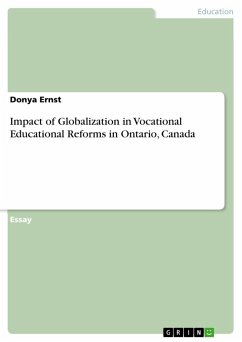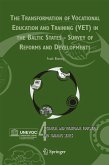Essay from the year 2015 in the subject Pedagogy - Job Education, Further Education, grade: A, University of Huddersfield, language: English, abstract: The focus of this essay is to establish the impact that globalization has had in vocational educational reforms in Canada, during three decades; 1970 to 2003. We will review background information in relation to the diverse educational system, its policies and how it is executed in Canada in general as well as further background history into the global economy within the vast geographical and globally integrated nation. The decline of the Keynesian welfare state and the rise of neo-liberal beginnings of the global economy in Canada will be examined with the intention of understanding why it had occurred. We will address the fact that both the UK and the US have had some influence on the global direction and vocational education policies in Canada. Through linking the strategic relationships within the different time periods of theglobal economy we can examine the effects on vocational educational reforms and their outcomes within that period of time. The educational policies in Canada are diverse in comparison with other OECD countries. Canada appropriates the decision-making responsibilities on a provincial level and not a federal level, it does not have a specific federal office of education. On the provincial level each province structures their own policies towards education, promoting primarily the development of skills necessary in their community and includes a degree of financial support through the federal, provincial and municipal levels. Section 91 of the Constitution Act, 1867 the federal government had gained jurisdiction over national defence, Indian affairs, the territories, prisons, external affairs and the economy. In general Canada upholds a high-quality educational system however it still requires improvement. Canada lacked child care policies, which resulted in difficulties for single parent families obtaining any employment, as well as targeting fair and just educational policies for the Aboriginal natives. The government has always tried to convince the public that extra money for educational reforms was not available, nor was it necessary. However, through history we have seen that large amounts of money have always been applied to new educational policies.
Hinweis: Dieser Artikel kann nur an eine deutsche Lieferadresse ausgeliefert werden.
Hinweis: Dieser Artikel kann nur an eine deutsche Lieferadresse ausgeliefert werden.


![The Normal School for Ontario [microform]: Its Design and Functions The Normal School for Ontario [microform]: Its Design and Functions](https://bilder.buecher.de/produkte/65/65536/65536042m.jpg)





